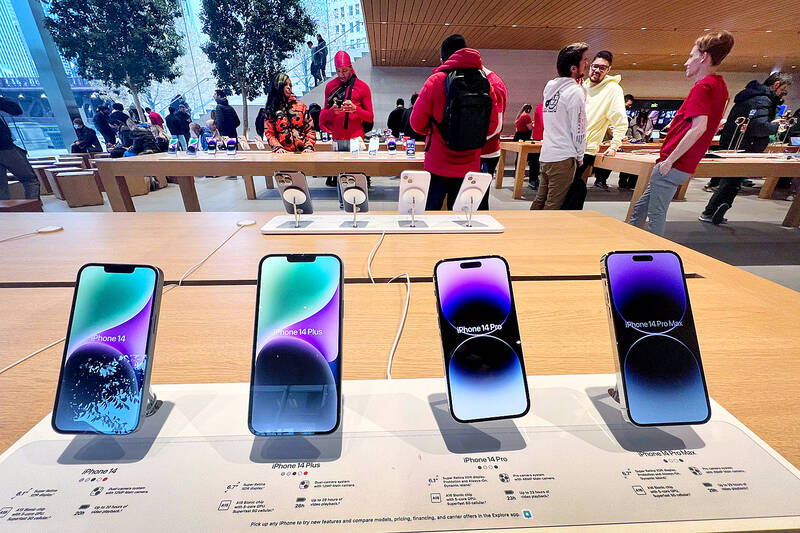A steady slide in Apple Inc shares pushed the iPhone maker’s market value below US$2 trillion, the latest casualty in the tech stock rout.
Apple fell 3.7 percent on Tuesday, closing at its lowest since June 2021, as concerns about iPhone supply in the important holiday quarter mount and investors lose faith in a reprieve from higher interest rates.
The slump sent Apple’s market value to US$1.99 trillion, ending its reign as the last company to sport a US$2 trillion valuation after Microsoft Corp and oil giant Saudi Arabian Oil Co (Saudi Aramco) retreated last year.

Photo: AFP
The milestone marks a fall from grace for Apple. The stock spent much of the past year outperforming the S&P 500 Index, but has stumbled in recent weeks amid fears that iPhone production problems in China would ruin holiday sales, the company’s most important period.
Exactly a year ago, Apple’s shares briefly rallied to climb above US$3 trillion in market value as the S&P 500 hit a record high.
The four largest US technology and Internet companies lost more than US$3 trillion in market value last year, amid soaring inflation and slowing sales growth that surged during the COVID-19 pandemic.
Last month was Apple’s worst month since May 2019 with a decline of 12 percent, steeper than the 9 percent decline for the tech-heavy NASDAQ 100 in the same period.
Apple, based in Cupertino, California, has suffered supply disruptions stemming from COVID-19 lockdowns in China, but those have been easing. Manufacturing partner Foxconn Technology Group (富士康科技集團) has brought the world’s largest iPhone plant back to about 90 percent of anticipated peak capacity.
The Zhengzhou facility, known as iPhone City, produces the vast majority of high-end iPhone 14 Pro and Pro Max devices. In November, thousands of workers had fled or staged protests against extreme COVID-19 rules.
However, Foxconn ended most of those restrictions last month and offered more incentives for new and current employees.
Another Apple supplier, Murata Manufacturing Co, added a note of pessimism last month.
The company said it expected the tech giant to reduce iPhone 14 production plans further in the coming months.
The iPhone accounts for about half of Apple’s revenue.
“Judging by handset availability in stores, I see a downward revision happening,” Murata president Norio Nakajima said in an interview. “I hope that it won’t be too deep.”
Meanwhile, Nikkei on Monday reported that Apple has told several suppliers to make fewer components for some products, including AirPods, the Apple Watch and MacBooks, given weakening demand.
Apple is expected to deliver its latest quarterly earnings report in the coming weeks. The quarter that runs through last month is its biggest sales period of the year, and analysts had initially projected record-setting revenue.
Now they are predicting a slight decline to US$122.9 billion, according to estimates compiled by Bloomberg.
Underpinning Apple’s valuation is the hope that the company still has major growth opportunities ahead. Services have been a key area of expansion in the past few years and represent more than one-fifth of revenue.

To many, Tatu City on the outskirts of Nairobi looks like a success. The first city entirely built by a private company to be operational in east Africa, with about 25,000 people living and working there, it accounts for about two-thirds of all foreign investment in Kenya. Its low-tax status has attracted more than 100 businesses including Heineken, coffee brand Dormans, and the biggest call-center and cold-chain transport firms in the region. However, to some local politicians, Tatu City has looked more like a target for extortion. A parade of governors have demanded land worth millions of dollars in exchange

Hong Kong authorities ramped up sales of the local dollar as the greenback’s slide threatened the foreign-exchange peg. The Hong Kong Monetary Authority (HKMA) sold a record HK$60.5 billion (US$7.8 billion) of the city’s currency, according to an alert sent on its Bloomberg page yesterday in Asia, after it tested the upper end of its trading band. That added to the HK$56.1 billion of sales versus the greenback since Friday. The rapid intervention signals efforts from the city’s authorities to limit the local currency’s moves within its HK$7.75 to HK$7.85 per US dollar trading band. Heavy sales of the local dollar by

Taiwan Semiconductor Manufacturing Co’s (TSMC, 台積電) revenue jumped 48 percent last month, underscoring how electronics firms scrambled to acquire essential components before global tariffs took effect. The main chipmaker for Apple Inc and Nvidia Corp reported monthly sales of NT$349.6 billion (US$11.6 billion). That compares with the average analysts’ estimate for a 38 percent rise in second-quarter revenue. US President Donald Trump’s trade war is prompting economists to retool GDP forecasts worldwide, casting doubt over the outlook for everything from iPhone demand to computing and datacenter construction. However, TSMC — a barometer for global tech spending given its central role in the

An Indonesian animated movie is smashing regional box office records and could be set for wider success as it prepares to open beyond the Southeast Asian archipelago’s silver screens. Jumbo — a film based on the adventures of main character, Don, a large orphaned Indonesian boy facing bullying at school — last month became the highest-grossing Southeast Asian animated film, raking in more than US$8 million. Released at the end of March to coincide with the Eid holidays after the Islamic fasting month of Ramadan, the movie has hit 8 million ticket sales, the third-highest in Indonesian cinema history, Film